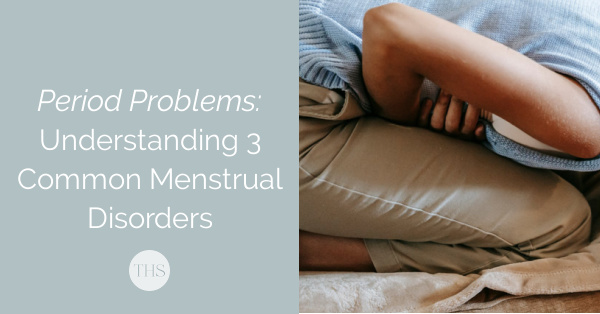5 Key Ways to Support a Loved One with a Chronic Disease

Unfortunately, some level of discomfort is considered normal when on your period, but sometimes, issues with menstruation can indicate that something isn’t right in our bodies. While many women have experienced some form of unusual period, whether it was a particularly heavy bleed or particularly painful month, often the reasons are clear.
Pregnancy, weight loss, stress, and your overall health can impact your period month to month. But if your symptoms are recurring, it’s best to get yourself checked out by a healthcare professional. Here, we explore three of the most common menstrual disorders and what they can look like.
Dysmenorrhea is a medical term for when someone has unusually painful periods, or severe menstrual cramps. In the U.S., up to 86% of women with dysmenorrhea do not seek help for the condition – but intense cramping that prevents you from engaging in daily activities, and can’t be numbed with generic painkillers, should always be investigated.
Especially painful periods can be a sign of something more serious, such as pelvic inflammatory disease, uterine fibroids, or an ectopic pregnancy. Each person may have different symptoms, but commonly people experience cramping in the lower abdomen, lower back pain, nausea, headaches and fatigue – with more severe symptoms including vomiting or fainting.
While any woman can develop dysmenorrhea, risk factors include smoking, being overweight, and having started your periods before the age of 11. If you think you may be experiencing this, consider reaching out to your doctor, as treatment plans will depend upon your unique circumstances.

Prolonged or excessive menstrual bleeding that lasts for more than seven days is considered to be a menstrual disorder called menorrhagia. This condition can also include heavier than typical bleeding: the average woman loses around 2-3 tablespoons of blood during her period, but people with menorrhagia can lose far more than that.
Abnormal menstrual bleeding can have many causes, including hormonal imbalances, uterine fibroids or polyps, and adenomyosis. As a general rule, if you’re needing to change your tampon or pad every hour for several hours consecutively, or having to double up with period products, you may be experiencing menorrhagia.
It’s crucial to seek help if you suspect you’re bleeding more heavily than usual during your period, as it could lead to anaemia. Plus, heavy bleeding may be a sign of another health condition which you need treatment for.
With such dramatic hormonal fluctuations due to menstruation, it’s no wonder women can often find it difficult to keep a constant state of mind – especially when on their period.
As many as 3 out of 4 women have experienced symptoms of PMS at some point in their lives, which include feeling overly anxious, irritable, tearful, angry or a frequent swing between heightened emotional states. You may also have intense food cravings, or find your concentration is lacking.
But for some people, the symptoms of PMS are severe enough to interrupt their daily lives. In this case, the disorder is called premenstrual dysphoric disorder (PMDD). If you’re struggling with how you are feeling each time you menstruate, be sure to book a check-in with your doctor. Sometimes, hormonal contraceptives can help create less intense fluctuations in your hormonal cycles and reduce symptoms of PMDD and PMS.

It may never become your favorite time of the month, but you should contact medical professionals for advice when your period is more painful, lasts longer or affects your (emotional) life more intensely than what’s considered ‘normal’.
Aside from treating the underlying causes, ask your doctor for tailored tips on how to best manage your symptoms, with over-the-counter pain medication, hormonal contraceptives and home remedies.
Author bio: Ava Matthews thrives on transforming ideas into impactful content that resonates with readers and helps them improve their lives. When she’s not writing, you can find Ava exploring new hobbies or curled up with a good book.
Learn more about what it feels like to live with menstrual disorders in ‘Pain, Periods and Peaks: On Living with Endometriosis’ or explore how you can make your menstrual cycle work for you.